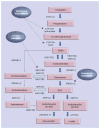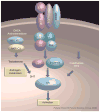Molecular mechanisms of castration-resistant prostate cancer progression
- PMID: 19903068
- PMCID: PMC3041149
- DOI: 10.2217/fon.09.117
Molecular mechanisms of castration-resistant prostate cancer progression
Abstract
Hormone-refractory prostate cancer is the result of regrowth of prostate cancer cells that have adapted to the hormone-deprived environment of the prostate. The process by which castration-resistant prostate cancer (CRPC) cells are generated appears to be varied. The complex mechanism of hormone resistance has been the topic of research in most laboratories that have analyzed the process from different angles. This review compiles research findings that explain the methods of development of hormone resistance in prostate cancer. Research data show many different processes to be involved in the acquisition of hormone resistance. Interestingly, one observes interdependence between these processes, indicating a complex network at play in the development of hormone resistance. Cytokines such as IL-6 have been shown to initiate an alternative signaling pathway, compared with the androgen receptor signaling pathway, in CRPC. IL-6 has been proposed to be the effector of the intracrine signaling pathway by influencing the levels of metabolic enzymes. Neuroendocrine cells are present at low levels in normal prostate, and signify the transitory phase of normal hormone-sensitive cells to hormone-refractory cells. IL-6 induces growth of neuroendocrine cells or neuroendocrine-like features in cells in CRPC. The increased presence of neuroendocrine cells in CRPC signifies a change in the prostate cell microenvironment. The stromal microenvironment also influences the development of CRPC in the hormone-refractory stage. In addition, intracrine androgen metabolic enzymes play a significant role in the development of the hormone refractory process. Despite hormone ablation, there is a residual level of hormones in cells due to active intracrine metabolic pathways. It is acknowledged that the androgen receptor plays the most influential role in development of prostate cancer. In addition to mutation and amplification, the androgen receptor has been characterized and shown to differ in sequence in CRPC compared with the androgen-sensitive prostate cancer cells. These variants of the androgen receptor through sequence changes may preserve the basic function of the molecule, but have far-reaching consequences on the cell as a whole. A multicombinatorial drug treatment approach has been suggested to target these multiple pathways in an effort to reduce the possibility of recurrence of CRPC.
Figures


References
-
- Isaacs JT. Role of androgens in prostatic cancer. Vitam Horm. 1994;49:433–502. - PubMed
-
- Trapman J, Cleutjens KB. Androgen-regulated gene expression in prostate cancer. Semin Cancer Biol. 1997;8(1):29–36. - PubMed
-
- Huggins C, Hodges CV. Studies on prostatic cancer I The effect of castration, of estrogen and androgen injection on serum phosphatases in metastatic carcinoma of the prostate. CA Cancer J Clin. 1972;22(4):232–240. - PubMed
-
- Hobisch A, Culig Z, Radmayr C, Bartsch G, Klocker H, Hittmair A. Distant metastases from prostatic carcinoma express androgen receptor protein. Cancer Res. 1995;55(14):3068–3072. - PubMed
-
- van der Kwast TH, Schalken J, Ruizeveld de Winter JA, et al. Androgen receptors in endocrine-therapy-resistant human prostate cancer. Int J Cancer. 1991;48(2):189–193. - PubMed
Publication types
MeSH terms
Grants and funding
LinkOut - more resources
Full Text Sources
Other Literature Sources
Medical
